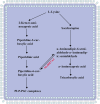Precision diagnosis and treatment of vitamin metabolism-related epilepsy
- PMID: 40217438
- PMCID: PMC11960229
- DOI: 10.1186/s42494-024-00169-0
Precision diagnosis and treatment of vitamin metabolism-related epilepsy
Abstract
Epilepsy is a chronic disorder of the nervous system caused by abnormal discharges from brain cells. Structural, infectious, metabolic, immunologic, and unknown causes can contribute to the development of seizures. In recent years, there has been increasing attention on epilepsy caused by genetic metabolic disorders. More than two hundred inherited metabolic disorders have been identified as potential cause of seizures, and they are mainly associated with energy deficiency in the brain, accumulation of toxic substances, abnormal neurotransmitter transmission, and deficiency of cofactors. Vitamins play a crucial role as components of several enzymes or coenzymes. Impaired metabolism of thiamine, biotin, vitamin B6, vitamin B12 and folic acid can contribute to early-onset seizures and developmental abnormalities in infants. However, timely supplementation therapy can significantly improve patient prognosis of affected patients. Therefore, a thorough understanding and investigation of the metabolic basis of epilepsy is essential for the development of precise therapeutic approaches, which could provide significant therapeutic benefits for patients.
Keywords: Epilepsy; Metabolism; Treatment; Vitamin.
© 2024. The Author(s).
Conflict of interest statement
Declarations. Ethics approval and consent to participate: Not applicable. Consent for publication: Not applicable. Competing interests: Author Yanchun Deng is the member of the Editorial Board for Acta Epileptologica, who was not involved in the journal’s review of or decisions related to this manuscript.
Figures



Similar articles
-
Effects of nutrients (in food) on the structure and function of the nervous system: update on dietary requirements for brain. Part 1: micronutrients.J Nutr Health Aging. 2006 Sep-Oct;10(5):377-85. J Nutr Health Aging. 2006. PMID: 17066209 Review.
-
Vitamin-responsive disorders: cobalamin, folate, biotin, vitamins B1 and E.Handb Clin Neurol. 2013;113:1799-810. doi: 10.1016/B978-0-444-59565-2.00049-6. Handb Clin Neurol. 2013. PMID: 23622402 Review.
-
Chapter 30: historical aspects of the major neurological vitamin deficiency disorders: the water-soluble B vitamins.Handb Clin Neurol. 2010;95:445-76. doi: 10.1016/S0072-9752(08)02130-1. Handb Clin Neurol. 2010. PMID: 19892133 Review.
-
[Does diet affect our mood? The significance of folic acid and homocysteine].Pol Merkur Lekarski. 2009 Feb;26(152):136-41. Pol Merkur Lekarski. 2009. PMID: 19388520 Review. Polish.
-
Vitamins and brain development.Physiol Res. 1999;48(3):175-87. Physiol Res. 1999. PMID: 10523053 Review.
Cited by
-
Transporters in vitamin uptake and cellular metabolism: impacts on health and disease.Life Metab. 2025 Mar 10;4(3):loaf008. doi: 10.1093/lifemeta/loaf008. eCollection 2025 Jun. Life Metab. 2025. PMID: 40444179 Free PMC article. Review.
References
-
- Devinsky O, Vezzani A, O’Brien TJ, Jette N, Scheffer IE, de Curtis M, et al. Epilepsy. Nat Rev Dis Primer. 2018;4:18024. - PubMed
-
- Campistol J. Epilepsy in inborn errors of metabolism with therapeutic options. Semin Pediatr Neurol. 2016;23(4):321–31. - PubMed
-
- Tumienė B, Peterlin B, Maver A, Utkus A. Contemporary scope of inborn errors of metabolism involving epilepsy or seizures. Metab Brain Dis. 2018;33(6):1781–6. - PubMed
-
- Wang HS, Kuo MF. Vitamin B6 related epilepsy during childhood. Chang Gung Med J. 2007;30(5):396–401. - PubMed
Publication types
Grants and funding
LinkOut - more resources
Full Text Sources
